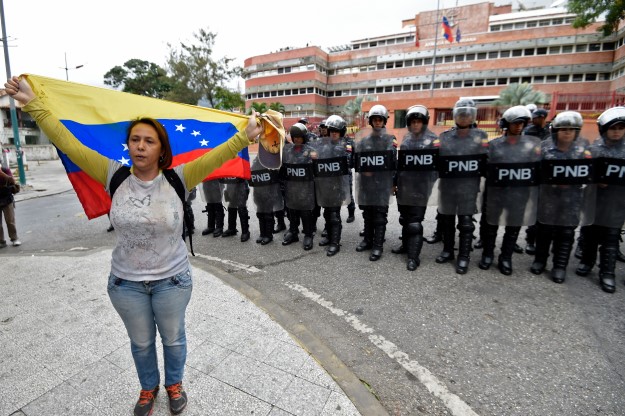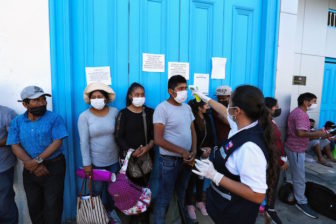This piece has been updated.
Over the past several years, international commentators have repeatedly underestimated Nicolás Maduro, deriding his lack of charisma and doubting that he’d survive much longer as Venezuela’s president. But with the support of the armed forces, the police and informal militias, Maduro’s shrewd Machiavellian instincts have allowed him to remain in power despite destroying his country’s economy, imprisoning hundreds of political opponents, and forcing nearly 10% of the population to flee.
Maduro’s luck will eventually run out, although the men with guns do not seem in a hurry to abandon him. But the sobering truth is that whoever succeeds him will have to be a master of frustrating expectations – and be willing to disappoint many actors both inside and outside of the country who dream of a “clean break” with the past. In the ideal scenario, Venezuela’s transition will be a slow, messy process involving painful compromises.
There is a belief, possibly due to wishful thinking or oversimplification, that ousting Maduro and organizing free elections will quickly solve Venezuela’s main problems. While putting an end to Maduro’s terrible reign is a necessary condition to overcome the crisis, it will not automatically stabilize the country politically and economically, even if the international community is patient enough to provide massive aid to Venezuela for years.
First, Maduro’s successor will have to satisfy the broad popular desire to turn the page and punish those responsible for corruption and human rights violations during chavismo. The pressure to organize a witch hunt against Maduro allies will be enormous. Many Venezuelans despise the National Bolivarian Police (PNB), in particular its Special Action Forces (FAES) – essentially a death squad used to attack political opponents – and will expect punishment for its members.
Yet at the same time, to maintain order the next government will need to depend on the armed forces and police, neither of which will be inclined to allow a thorough investigation into past abuses. The compromise will probably involve a few high-profile trials combined with a broad amnesty for the rest, generating an outcry among many of Maduro’s critics.
Given that a bloated group of generals – Venezuela has almost 2,000 – have little incentive to give up the enormous privileges and wealth they have amassed in recent years, the armed forces are bound to continue to play a key role in the country’s economy and politics. It is quite likely that Maduro’s successor will be a general – but even a civilian such as Juan Guaidó would have to govern in constant negotiation with the armed forces, or face the fate of Egypt’s former President Mohamed Morsi, who won the first free vote after the revolution in 2011, only to be ousted a year later by the military.
Secondly, the new government would, to no small extent, depend on the support of chavista bureaucrats to stabilize the country. The late Hugo Chávez and Maduro merged state and party to such a degree that there are no neutral technocrats left, and removing anybody who sympathized with them would leave the country even more dysfunctional than it is now. After all, the approximately 100,000-strong armed forces and the about 23,000 men and women that make up the National Guard are, despite the abuses committed by them, one of the few structures that keeps Venezuela from a complete breakdown of order. That means that, should Maduro fall, an all-out purge must be avoided. (Behind closed doors, some members of the opposition already admit the transition may have to involve keeping many key bureaucrats in place.)
A third major dilemma will be what to do with the thousands of armed civilians (so-called colectivos) which also play a key role doing the Maduro regime’s dirty work. Disbanding and prosecuting them seems like a popular choice at first – but that would merely drive these countless young men, who lack professional opportunities, to join drug cartels and other criminal groups. Unless they can quickly be integrated into the economy – a highly unlikely scenario – they will continue operating as armed militias in search of economic gain.
A fourth issue regarding post-Maduro Venezuela is that outside observers take for granted that free elections would bring moderate groups to power. Yet today’s Venezuelan opposition, which has committed numerous mistakes in the past, includes both democratic and non-democratic elements – including those who played a role in the 2002 military coup against Chávez, and others who have welcomed wholeheartedly the election of right-wing populist Jair Bolsonaro in Brazil. Opposition infighting and back-stabbing is legendary and portends badly for what is to come. “There are too many big egos, not enough pragmatism in the opposition,” a former Venezuelan bureaucrat recently told me.
Additionally, many expect that free elections would lead to the collapse of the ruling PSUV. Yet a closer analysis reveals that the party’s dominance over the past two decades could help it do well in a free and fair election, for example by picking a moderate chavista candidate. That could give the party considerable influence on any Maduro successor – whose legitimacy the party could question at every turn, particularly given the U.S. government’s heavy-handed rhetoric. Just like peronismo in Argentina, chavismo may become a significant political force in post-Maduro politics, producing effects that are very hard to predict.
Finally, Maduro’s successor will take over an economy in such bad shape that it can only be compared to post-conflict societies. With nearly 10% of Venezuela’s population abroad and many well-educated young people unlikely to return, a dilapidated infrastructure, and an entire generation decimated by diseases long thought of as things of the past, Venezuela’s path to economic recovery will be long and almost certainly slower, with far more setbacks, than many hope and expect.
This piece was updated to reflect the fact that the number of armed civilians is unknown.








